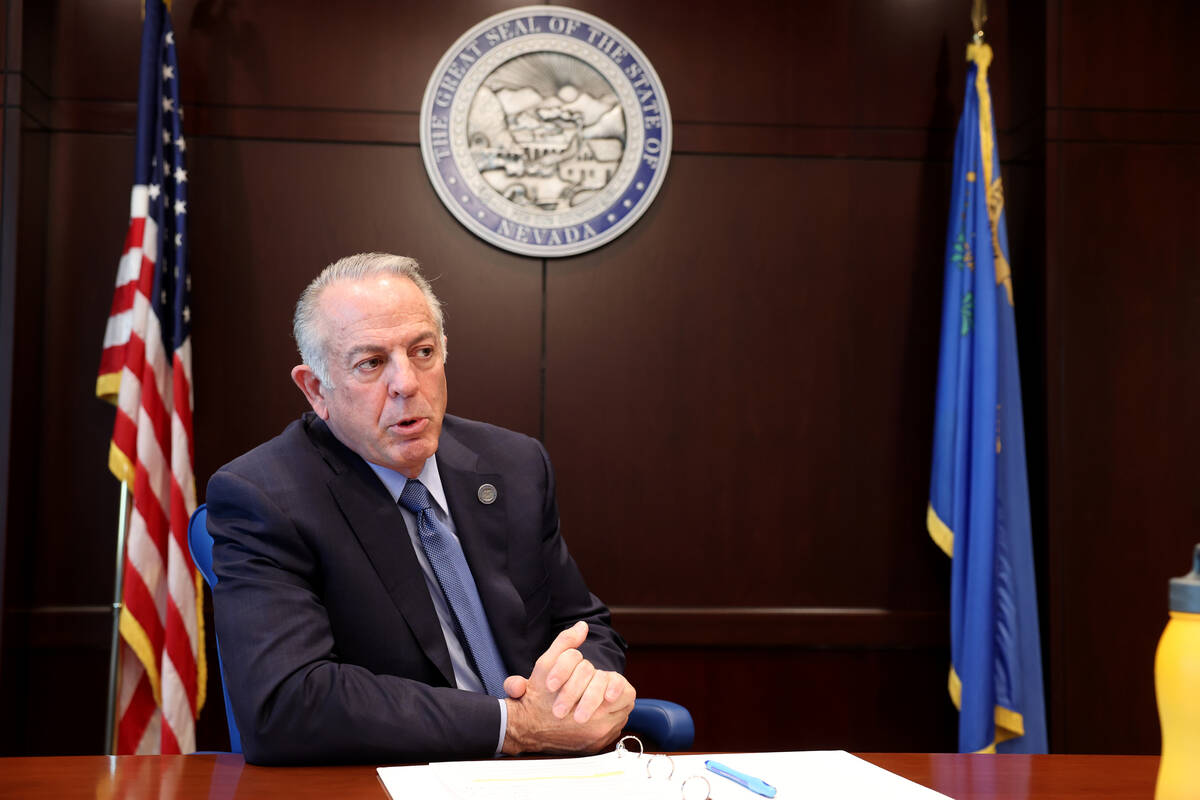The DOJ declares Nevada as a ‘sanctuary’ for undocumented immigrants
Nevada is one of a dozen states labeled by the Trump administration as a so-called “sanctuary” for undocumented immigrants, according to a list unveiled Tuesday by the Department of Justice.
The designation — which was met with confusion and rejection from Nevada officials — comes months after the city of Las Vegas was among hundreds of jurisdictions placed on a similar list and as President Donald Trump moves to fulfill his “mass deportations” campaign promise.
The DOJ didn’t specifically say why Nevada is a sanctuary, but it compiled nine bullet points justifying the designation of the 13 states, the District of Columbia, four counties and 18 cities. No other Nevada jurisdiction was included in the list, despite the entire state making it.
Justifications for the designations include public declarations, laws and directives that limit local law enforcement collaboration with U.S. Immigration and Customs Enforcement and a lack of information sharing. It also included jurisdictions that prohibit local funds from being used to support federal immigration enforcement efforts, as well as jurisdictions that provide access to benefits, such as health care assistance, legal aid and housing assistance.
“Sanctuary policies impede law enforcement and put American citizens at risk by design,” said Attorney General Pamela Bondi in a news release Tuesday. “The Department of Justice will continue bringing litigation against sanctuary jurisdictions and work closely with the Department of Homeland Security to eradicate these harmful policies around the country.”
The designations will be reviewed “regularly,” and the jurisdictions will have an opportunity to respond and “remediate their policies, practices, and laws,” according to the DOJ.
Reached for additional information about Nevada’s status, a DOJ spokesperson referred additional comment to the White House, which did not immediately respond.
State officials reject designation
Officials are unclear as to how the state of Nevada made it on the list, and they think it is a mistake.
Rep. Mark Amodei, R-Nev., said he was surprised about the statewide designation, especially since no Nevada municipalities are on the list.
“It’s almost like you went and had a full body scan for cancer, and it’s all negative — and you have cancer,” Amodei told the Las Vegas Review-Journal.
In contrast, New Jersey is not included as a sanctuary state on the list, despite its two biggest cities being on it, Amodei said.
As the chairman of the Homeland Security appropriations committee, he said he hadn’t heard about any part of Nevada where law enforcement was “flipping the bird at ICE and telling them we’re not going to cooperate.”
“This does not appear to be the Department of Justice’s finest administrative hour in terms of generating lists of things,” Amodei said.
The offices of Nevada’s senators, Jacky Rosen and Catherine Cortez Masto, also rejected the designation. Rosen’s office said in a statement there are no sanctuary jurisdictions in Nevada, and she is concerned about how the Trump administration’s “false labeling” could impede Nevada from accessing federal funds.
Gov. Joe Lombardo’s spokesperson, Elizabeth Ray, said Nevada has followed all federal laws and cooperated with federal immigration authorities, and she said the state will continue to do so. The governor has previously contested Las Vegas’ designation.
“The state has repeatedly reached out to the Department of Justice for clarification on its designation and looks forward to their timely response, so the state can ensure future cooperation between Nevada and the administration,” Ray said in an email.
She also took swings at Democratic Attorney General Aaron Ford, accusing him of attempting to implement sanctuary policies, and said despite that, “Nevada is not a sanctuary state and will never be a sanctuary jurisdiction under Governor Lombardo.”
In February, Ford released nonbinding recommended immigration policies, which included recommendations for law enforcement officers to focus on preventing and investigating crime, “not engaging in unpaid and non-criminal federal immigration enforcement.”
The Nevada Sheriffs’ and Chiefs’ Association released its own model policy, which recognizes that ICE has primary jurisdiction over enforcement of federal immigration laws and says that Nevada peace officers may assist “as deemed appropriate by the agency’s executive authority.”
Ford said in a social media post that he does not support policies that provide sanctuary to criminals.
“President Trump and Governor Lombardo have the same chaotic approach to governance that has been rooted in their utter disregard for the truth, and their use of the term ‘sanctuary’ policies is merely more of the same,” Ford said.
Michael Kagan, the director of the UNLV Immigration Clinic, said in an email that there is no legal basis for the definition of sanctuary announced Tuesday, and it is unclear why Nevada is included.
“This seems to be an attempt to bully and intimidate local and state governments, but courts have already held that attempts by the Trump Administration to withhold funding from so-called sanctuary jurisdictions violate the law,” Kagan said in an email.
Rep. Steven Horsford, D-Nev., said declaring Nevada a sanctuary state threatens grants and federal resources his constituents are entitled to, such as funding for job training, education, small business development and health care.
Part of larger immigration goals
On April 28, a Trump executive order, “Protecting American Communities From Criminal Aliens,” laid out the sanctuary designations and outlined possible consequences.
It directed the Office of Management and Budget to identify federal funds “for suspension or termination, as appropriate.”
If jurisdictions don’t comply after they’re noticed, the DHS “shall pursue all necessary legal remedies and enforcement measures to end these violations and bring such jurisdictions into compliance with the laws of the United States,” according to the executive order.
When the Department of Homeland Security labeled Las Vegas a sanctuary in May, Nevada officials quickly denounced the claim.
The DHS list was taken down shortly after it was uploaded, and the federal government never said why the city was included in the first place.
A city spokesperson told the Review-Journal that Las Vegas officials learned about the state’s sanctuary classification on Tuesday.
“The city of Las Vegas has never designated itself as a sanctuary city, and we have not been designated as such in this latest list from the federal government,” the spokesperson wrote in a statement.
The city deferred additional comment to state officials.
A day after Las Vegas was tagged as a sanctuary on May 29, Kevin McMahill signed onto a 287 (g) agreement with ICE. The contract allows Clark County Detention Center personnel to serve warrants on certain immigrants booked at the jail, allowing federal agents up to 48 hours to pick them up after the inmates are set to be released.
The Metropolitan Police Department already informally collaborated with ICE at the jail, flagging “foreign-born” inmates booked on counts of violent crimes, domestic violence, DUI and theft-related offenses reportable under the Laken Riley Act.
McMahill previously told the Review-Journal that those conversations were ongoing before the sanctuary designation.
Three other Nevada sheriff’s offices have signed 287 (g) pacts, and each limits collaboration with ICE to the jails.
Contact Ricardo Torres-Cortez at rtorres@reviewjournal.com. Contact Jessica Hill at jehill@reviewjournal.com. Follow @jess_hillyeah on X.


















